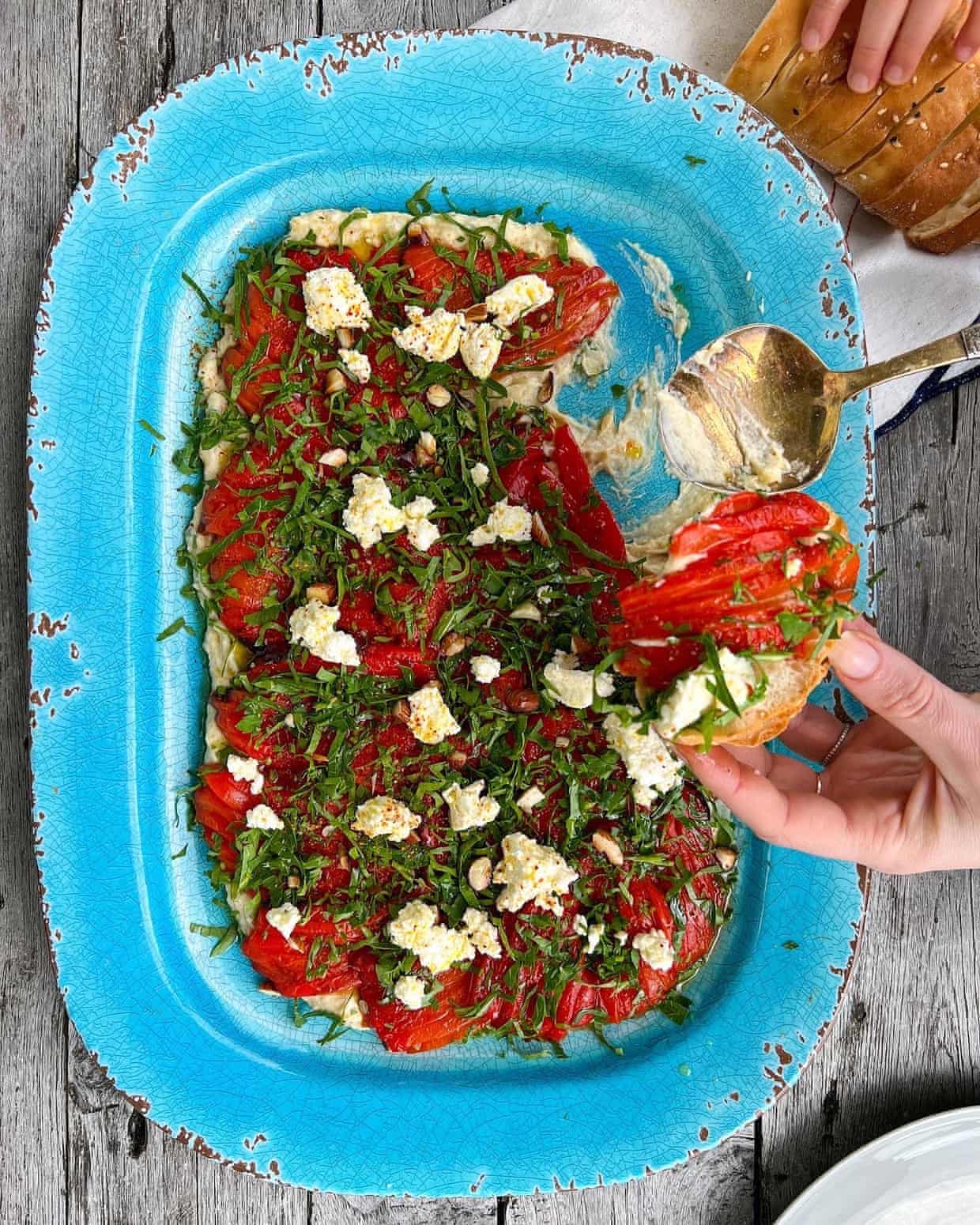Alice Zaslavsky’s recipe for garlic red peppers with a creamy white bean dip, AKA papula

This week, I’ve been putting the finishing touches on an interview I recorded with legendary Australian cheesemaker Richard Thomas, the inventor of an ingredient you may not even realise is Australian: marinated feta, AKA “Persian fetta”.An unexpected stop on a trip to Iran in the 1970s gifted Thomas a chance meeting with a Persian doctor and his breakfast: fresh labneh with soft, still-warm lavash.It was a revelation.On his return, Thomas got to work creating a fresh cheese from goat’s milk (similar to chèvre) and from cow’s milk, marinated and preserved in oil, with an extra “t” to avert confusion with the Greek-style feta, that’s still being utilised by cooks and chefs right across the world.Persian fetta is a shapeshifter, capable of remaining both firm and steadfast when crumbled across the top of a platter or salad, and of yielding to a soft, velvety cream, enhancing all manner of dishes from pasta to pesto to whipped dips and schmears – and, of course, as a topping for that Aussie cafe staple, avocado toast.
When cafe culture ground to a halt during the rolling Covid lockdowns, Persian fetta producers were left with bucketloads (literally) that would normally have been used by the city’s cafes, so instead they offered them to independent grocers and supermarkets.Stuck at home with my bucket of cheese, I’d plonk some into anything savoury I was testing – and I mean anything.In this recipe from my book Salad for Days, I incorporate that fetta funk into a creamy Balkan white bean dip known as papula, which I first came across via Olia Hercules.Adding cheese to the dip pumps up the flavour, and whip it into the kind of creamy bed we’ve come to see (and love) under medleys of roast veg, from modern restaurants and modern cooks (such as Meera Sodha in a recent Guardian recipe).Blanketed with strips of silky, crimson roast capsicum, this dish is packed full of beany, plant-forward protein that’s surprisingly substantial, whether you’re serving it for a decadent brunch, lunch, or light dinner, especially if it’s all mopped up with soft bread (lavash, pide, pitta or the like).
If you can’t find butter beans, any tinned or jarred white bean will work.Putting the garlic inside the capsicum while it’s roasting helps to flavour the pepper and keeps the garlic from burning, but you could use a quarter-teaspoon of garlic powder instead.And if you can’t find marinated feta where you are, you can totally use a block of soft feta (such as a Danish-style one) for this, instead.Heat the oven to 220C (200 fan)/425F/gas 7.Grab four to six medium red peppers (I go with one per person), lop off the tops and then halve them lengthways.
Pull out the seeds and pith.Oil the capsicum halves, then pop them cut side down on a lined tray, tucking four garlic cloves underneath.Roast for 35-40 minutes, until the capsicums are blistered and browning and the garlic is buttery inside.To make the papula, blitz 400g cooked and drained butter beans, with a tablespoon of sherry vinegar, 60ml olive oil and a good pinch of flaky sea salt, then add two-thirds of a jar of marinated fetta (or 200g soft Danish-style feta; reserve the rest of the block for garnish) and blitz again until smooth.Once the garlic is cooked and cool enough to touch, squish the flesh into the bean mixture, blitz again and season to taste.
Once the peppers are out of the oven, cover them with a second (inverted) oven tray or a few sheets of foil, then leave for 15 minutes to steam and relax.When they are cool enough to handle, slip off and discard the skins, then slice the cheeks into thin slivers with a sharp knife.Wrap the soft bread in foil and pop into the still-hot oven to warm through while the capsicum cools.To serve, scoop the whipped papula on to a large platter in undulating waves.Arrange the pepper slices on top in bright red, glossy strips.
Dress with the tray juices, sprinkle with a good handful of finely chopped parsley, then blob or crumble on the last of the feta.Sprinkle with some sweet or smoky paprika, a handful of roasted almonds (roughly chopped, flakes or slivers), an extra drizzle of olive oil and a sprinkling of salt flakes.Pop the warm bread nearby and encourage everyone to scoop and dip to their heart’s content.Alice Zaslavsky is a Guardian Australia food columnist

Pam Zinkin obituary
My mother, Pamela Zinkin, who has died aged 94, was a consultant paediatrician credited with saving the lives of children all over the world. She was also a lifelong campaigner for the NHS.In 1977, by then a single parent with two young sons, Pam moved to newly independent Mozambique to work as a senior paediatrician, then head of paediatrics, at Maputo central hospital. The country’s healthcare was in a precarious state, with 80% of its doctors having left after independence in 1975. Within five years, Pam and her team had reduced mortality among the 8,000 annual child admissions from 25% to 4%

Are resident doctors right to strike over pay? | Letters
I totally support the resident doctors’ strike (Why the NHS doctors’ strikes look set to continue, 14 October). I am a retired consultant anaesthetist who worked in the NHS for 40 years. Throughout my career, I felt that I was totally underpaid for my work.As a junior doctor in the 1970s and up until my consultant appointment in 1991, I was paid a pittance for working excessive, unsafe hours – often 80 to 100 hours a week. Accommodation and catering were minimal

Labour is privatising the NHS in plain sight | Letter
Gaby Hinsliff is right to ask if the government’s reorganisation of the National Health Service will be the final nail in its coffin (Wes Streeting’s gamble with the NHS is greater than any play for Downing Street, 14 November). Such large‑scale redundancies are bound to create problems.There are other threats to the delivery of NHS services too. The privatisation of the NHS is happening in plain sight. Last month, the government proudly announced that “A total of 6

Krysty was diagnosed with breast cancer months after getting the all-clear. New Australian guidelines aim to help women like her
When Krysty Sullivan had a routine mammogram in 2019, she was given the all-clear.Eleven months later, she felt a lump.Doctors discovered two tumours, each more than 2cm in size. Sullivan, then 48 years old, was diagnosed with triple-negative breast cancer, a type that can be challenging to treat as the cancer cells do not respond to typical targeted treatments.“It’s always a shock to hear that you have breast cancer, but to learn that I had it months after I had a clear mammogram … it was like the Earth shifted,” Sullivan said

Mahmood and Lammy breached human rights law over segregation of prisoner, judge finds
Shabana Mahmood and David Lammy have been found to have breached a prohibition on inhuman or degrading treatment with respect to a prisoner who spent months segregated from other inmates, in what is believed to be a legal first.Sahayb Abu was confined to his cell at HMP Woodhill in Milton Keynes, for 22 hours a day and prevented from associating with other prisoners for more than four months after Hashem Abedi, the brother of the Manchester Arena bomber, allegedly attacked prison officers at HMP Frankland.Abu, a convicted terrorist serving a life sentence, was already being held in a separation centre for prisoners believed to be at risk or radicalising others, which has also been described as small group isolation, but was moved to even more restrictive conditions following the attack by Abedi in April.In what is believed to the the first instance of ministers being found in breach of article 3 of the European convention on human rights, Mr Justice Sheldon found that Lammy, the justice secretary, and Mahmood, his predecessor, should have considered Abu’s existing mental health issues before he was moved.In his written judgment, the judge said: “In the context of a prisoner who has a history of trauma and where there was a failure to obtain an assessment of his needs even though he was known to have mental health issues, and a failure to provide him with any therapeutic treatment to address his trauma, a contravention of article 3 is made out, notwithstanding the importance of the aim behind the segregation regime

Coroners’ advice on maternal deaths in England and Wales routinely ignored, study finds
The advice given by coroners in England and Wales to help prevent maternal deaths is not being acted upon, research suggests.Academics at King’s College London looked at prevention of future deaths (PFD) reports issued by coroners in cases of pregnant women and new mothers who died between 2013 and 2023. They found these reports were not being “systematically used nationally”.The study, published in the BMJ Gynecology and Obstetrics Clinical Medicine, identified 29 PFDs involving maternal deaths, but found that nearly two-thirds of these reports were ignored.Two-thirds of deaths occurred in hospitals, with more than half of the women dying after giving birth

Wall Street rallies after US economy added more jobs than forecast in September, after shock losses in August – as it happened

Asda to raise £568m in store sell-off as sales continue to fall

French authorities investigate alleged Holocaust denial posts on Elon Musk’s Grok AI

‘We excel at every phase of AI’: Nvidia CEO quells Wall Street fears of AI bubble amid market selloff

Steve Smith bites back at Panesar’s sandpaper sledge with Mastermind jibe

Carlton are riding high on an AFLW wave of momentum. Just don’t call it a fairytale | Sarah Guiney